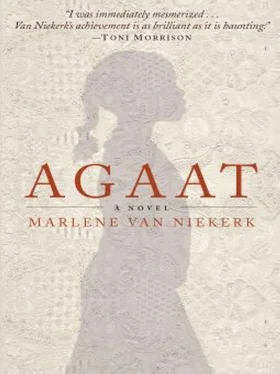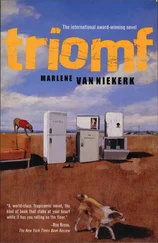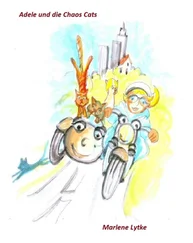He put his hand in front of his face, one hand around his throat. You were afraid he might have a fit. He plucked at his clothes as if there was something crawling on him.
You, you suck me dry, you worm my guts out of me, that’s what you do, a leech, that’s what you are! Nobody knows it, nobody can guess it, nobody can read between the lines, but don’t think I don’t see through you. Even if I’m the only one who sees, even if you fool everybody else around you. I hear how you talk to the neighbour’s wife, I hear it all. I don’t buy your story. I don’t buy it any longer, do you hear! I don’t buy it! Your tale that you spin everyone! The fine, intelligent Milla de Wet! How sensitive! How hard-working! Lonely! Long-suffering! It’s a lie, an infamous lie! You don’t suffer, you flourish, that’s what! You’re in your element here! A sow is what you are, an eternally ravenous sow with teeth like that! With wings! In Jerusalem! You’re in the trough! In the trough with your snout in the swill! That’s where you are! You batten on me!
Jak’s voice broke with the force of his shouting. He sank to his knees. His shoulders were hunched. The bones of his skull showed through the stubble. You poured a glass of water from the carafe on the table and held it out to him. He didn’t want to take it. He struggled to his feet. He stood in the corner of the sitting room pressed against the curtains, trembling, ashen-faced. You placed the glass of water on the coffee table, your hands in front of you to show that you weren’t coming closer.
I’ll go, you said, I’ll leave the room, just calm yourself. Rather go and lie down. Should I phone a doctor? you asked.
He averted his face. His Adam’s apple went up and down as he swallowed. The front of his shirt was stained with dark patches of sweat.
You went out onto the front stoep. You thought, what now? how to carry on? You looked back through the window at the uncleared supper table. The wine bottle was still more than half full. So Jak wasn’t drunk. You looked out over the yard to see whether you could see Agaat and Jakkie’s lantern. You could go to them.
They know that I’m good, mostly good, they know how gentle I can be. You remembered when you were small, how your father sometimes after he’d quarrelled with your mother, came and sat on the edge of your bed, and stroked his hand over your forehead, how your mother would later join him, and how they would try to effect peace between themselves by telling you bedtime stories.
You heard from the dogs in the backyard and the slamming of the screen door that they were back from the dam. Agaat would see to it that Jakkie had a bath and got to bed. You would go to them, to the steam and the aromatic soap and the white towels. You could get them to hurry up so that the table could be cleared, you could help Agaat with it, pack the leftovers in the fridge, and carry on with the normal things, with your life.
But you remained standing there on the stoep listening to Jak pouring himself a glass of wine. He came out and stood next to you.
There’s another story here, Milla, he said, you don’t want to hear it because you can’t manage anger and disillusionment and breakdowns. It’s doubly difficult for you because at the same time it’s energy that you can’t do without. But we know that you have your nose in the story-books all the time. Perhaps you’ll understand it better in the form of a fairy tale. Perhaps you’ll get the point then. I can come and tell it to your whole cake-and-tea club one day, because you are of the same species.
You didn’t look at each other. You gazed into the dark garden. You wrapped your arms around yourself.
Once upon a time there was a man who looked at himself in the mirror and thought that he was good enough, said Jak. He took a draught from his glass.
He was word-perfect as if he’d rehearsed it many times in his head. But he was silent for a long time before continuing.
I don’t know if I want to listen to this, you said.
You turned around and went inside, but he followed you. Agaat came in by the inside door and started clearing the table. Her face was set straight, but you could see she knew exactly what was happening.
Jak started again, more emphatically. Did he want Agaat to hear? You knew that he liked playing to an audience, but here it was as if he was calling a witness.
Once upon a time there was a man who looked at himself in the mirror and thought that he was good enough, he said again, emphasis on every word.
He started stacking the plates himself, something he never did. Agaat kept her eyes averted, but you could see her listening.
To and fro between the kitchen and the dining room the three of you moved as you cleared the table. Jak saw to it that nobody missed a thing. His voice was still hoarse with shouting, full of bitter and sarcastic intonations. It was not the first time that you’d heard something in this mockingly bombastic strain from him, there had been previous times, bits and pieces of it, but now it was a complete tale, causes and effects and details.
Agaat, you said, get going to the outside room.
She ignored you. Her eyes were fixed on Jak.
No problem, Agaat is welcome to stay, Jak said, she’ll be able to use it someday, let her hear by all means, it’s good general background for any domestic drudge. I can do with a bit of credibility in her eyes. She’ll know what I’m talking about.
The man, Jak continued his story, was a farmer, he was rich, he was clever, he was strong. So then he married a woman who admired his talents.
How good-looking you are, how good you are, how wonderful!
But it was all just lip-service.
It was because she thought herself weaker and more stupid than she really was. Ugly duckling, no swan in sight. Sob.
She thought, well then, I’ll just find myself an attractive husband, then it reflects on me as well.
But she felt no better even though he shone fit to burst. She was always worried about everything and always complained about everything. She complained about the earth and complained about the water and complained about the air and complained about the fire. Nothing was ever to her taste. She wanted her husband to right everything that she found wrong on their estate. The ploughshare and the sheep-shear and the stable and the table and the roof and the floor and the mincers and the pincers and the pens and the hens. She wanted him to be the master and control everything as she would do it herself if she herself could be good-looking and strong and clever and rich and be the master. Follow my drift?
Help me with this and help me with that, she whinged and carried on as if she had no hands. Even though she knew everything about farming she fancied that she could initiate nothing without him. She wept when he had to go on a journey and when he was with her, it had to be in such otherwise ways which he didn’t understand, that he got quite discouraged. Stuff me a teddy bear, whistle like a mackerel for me.
You don’t love me enough, you don’t care enough for me, she went around all day sighing and doctored herself with a glass of wine, with a sleeping pill, with cookies, with chocolate, with talking on the telephone.
And she was always full of complaints. My legs are heavy, my arms feel tired. And at night she sleep-walked through the house in her black shawls and with her fluttering eyelashes.
What strange behaviour, the man thought as he led her back to her bed. I give her everything, what else could she want from me? How can I ever make her happy? he wondered as he lay behind her in the dark until she calmed down. And thus he became a hero of introspection, without anybody’s suspecting it, a silent ponderer of his fate, but that’s best left there, dear members of the audience.
Читать дальше












